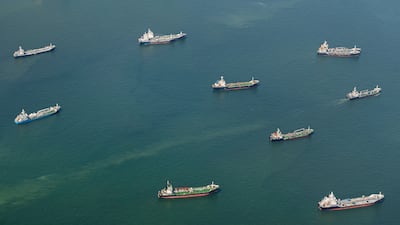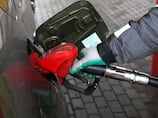Opec+ on Sunday agreed to another output increase for December as the supergroup of oil producers led by Saudi Arabia and Russia continues to bring more barrels into the market. The eight Opec+ countries also agreed to pause the oil output increases for the first quarter of 2026.
The group, which also includes Iraq, UAE, Kuwait, Kazakhstan, Algeria, and Oman, decided to raise production by 137,000 barrels per day for next month, similar to October and November levels of increase, Opec+ said in a statement on Sunday.
The move was in light of a "steady global economic outlook and currently healthy market fundamentals, as reflected in low oil inventories," according to the statement.
The group decided to pause in production increments in January, February and March due to seasonality.
However, the rate of 1.65 million barrels per day "may be returned in part or in full subject to evolving market conditions and in a gradual manner," it said.
The eight countries will meet on November 30.
This will be the ninth consecutive month that Opec+ is boosting production as it focuses on regaining market share and supporting the growth of its economies.
In September, it completed the unwinding of 2.2 million bpd of cuts that were first announced in November 2023 and implemented starting in April this year.
The group is currently unwinding 1.65 million bpd of voluntary cuts announced in April 2023. For the month of October and November, the group approved adding about 137,000 bpd for each month.
The group will meet next on November 30 to review market conditions and decide future production policy.
Oil markets have remained volatile this year amid geopolitical tensions in the Middle East and tariffs announced by the US President Donald Trump.
US decision to announce sanctions on Russian oil companies Lukoil and Rosneft and Federal Reserve's decision to cut interest rates also impacted oil markets.
Oil prices jumped as much as 5 per cent on US sanctions on Russian oil companies last month as a result of supply concerns in the market from one of the largest producers of oil in the world.
The Fed lowered its benchmark rate by 25 basis points on Wednesday after lowering interest rates by similar levels in September, that led oil prices to trade higher.
Lowering interest rates usually supports oil prices as borrowing becomes less expensive for businesses to spend on business growth that in turn stimulates economic growth that pushes demand for oil higher.
“Investors interpreted the policy shift as supportive for short- and medium-term demand and global growth sentiment,” Claudio Galimberti, chief economist and global market analysis director at Rystad Energy, said.
“The Fed’s decision underscores a broader turn in its policy cycle – one that favours gradual reflation and support over restraint, providing a tailwind to commodities sensitive to economic activity.”
However, over supply concerns and weak demand continued to affect oil markets.
Brent crude oil prices are forecast to fall from an average of $68 in 2025 to $60 in 2026 – a five-year low, the World Bank said in a report last month, citing stagnation of oil consumption in China and a rise in demand for electric vehicles.
Brent, the benchmark for two-thirds of global crude oil, settled 0.62 per cent higher at $64.77 a barrel when markets closed on Friday. West Texas Intermediate, the US gauge for crude, was up 0.68 per cent to close at $60.98 a barrel.
Skoda Superb Specs
Engine: 2-litre TSI petrol
Power: 190hp
Torque: 320Nm
Price: From Dh147,000
Available: Now
The biog
Job: Fitness entrepreneur, body-builder and trainer
Favourite superhero: Batman
Favourite quote: We must become the change we want to see, by Mahatma Gandhi.
Favourite car: Lamborghini
MATCH INFO
Wales 1 (Bale 45 3')
Croatia 1 (Vlasic 09')
Types of policy
Term life insurance: this is the cheapest and most-popular form of life cover. You pay a regular monthly premium for a pre-agreed period, typically anything between five and 25 years, or possibly longer. If you die within that time, the policy will pay a cash lump sum, which is typically tax-free even outside the UAE. If you die after the policy ends, you do not get anything in return. There is no cash-in value at any time. Once you stop paying premiums, cover stops.
Whole-of-life insurance: as its name suggests, this type of life cover is designed to run for the rest of your life. You pay regular monthly premiums and in return, get a guaranteed cash lump sum whenever you die. As a result, premiums are typically much higher than one term life insurance, although they do not usually increase with age. In some cases, you have to keep up premiums for as long as you live, although there may be a cut-off period, say, at age 80 but it can go as high as 95. There are penalties if you don’t last the course and you may get a lot less than you paid in.
Critical illness cover: this pays a cash lump sum if you suffer from a serious illness such as cancer, heart disease or stroke. Some policies cover as many as 50 different illnesses, although cancer triggers by far the most claims. The payout is designed to cover major financial responsibilities such as a mortgage or children’s education fees if you fall ill and are unable to work. It is cost effective to combine it with life insurance, with the policy paying out once if you either die or suffer a serious illness.
Income protection: this pays a replacement income if you fall ill and are unable to continue working. On the best policies, this will continue either until you recover, or reach retirement age. Unlike critical illness cover, policies will typically pay out for stress and musculoskeletal problems such as back trouble.
RESULT
Chelsea 2
Willian 13'
Ross Barkley 64'
Liverpool 0
Company%20profile
%3Cp%3E%3Cstrong%3ECompany%20name%3A%20%3C%2Fstrong%3EHakbah%0D%3Cbr%3E%3Cstrong%3EStarted%3A%20%3C%2Fstrong%3E2018%0D%3Cbr%3E%3Cstrong%3EFounder%3A%20%3C%2Fstrong%3ENaif%20AbuSaida%0D%3Cbr%3E%3Cstrong%3EBased%3A%20%3C%2Fstrong%3ESaudi%20Arabia%0D%3Cbr%3E%3Cstrong%3ESector%3A%20%3C%2Fstrong%3EFinTech%0D%3Cbr%3E%3Cstrong%3ECurrent%20number%20of%20staff%3A%20%3C%2Fstrong%3E22%20%0D%3Cbr%3E%3Cstrong%3EInitial%20investment%3A%20%3C%2Fstrong%3E%24200%2C000%0D%3Cbr%3E%3Cstrong%3EInvestment%20stage%3A%20%3C%2Fstrong%3Epre-Series%20A%0D%3Cbr%3E%3Cstrong%3EInvestors%3A%20%3C%2Fstrong%3EGlobal%20Ventures%20and%20Aditum%20Investment%20Management%0D%3Cbr%3E%3Cbr%3E%3C%2Fp%3E%0A
The National Archives, Abu Dhabi
Founded over 50 years ago, the National Archives collects valuable historical material relating to the UAE, and is the oldest and richest archive relating to the Arabian Gulf.
Much of the material can be viewed on line at the Arabian Gulf Digital Archive - https://www.agda.ae/en
UPI facts
More than 2.2 million Indian tourists arrived in UAE in 2023
More than 3.5 million Indians reside in UAE
Indian tourists can make purchases in UAE using rupee accounts in India through QR-code-based UPI real-time payment systems
Indian residents in UAE can use their non-resident NRO and NRE accounts held in Indian banks linked to a UAE mobile number for UPI transactions



